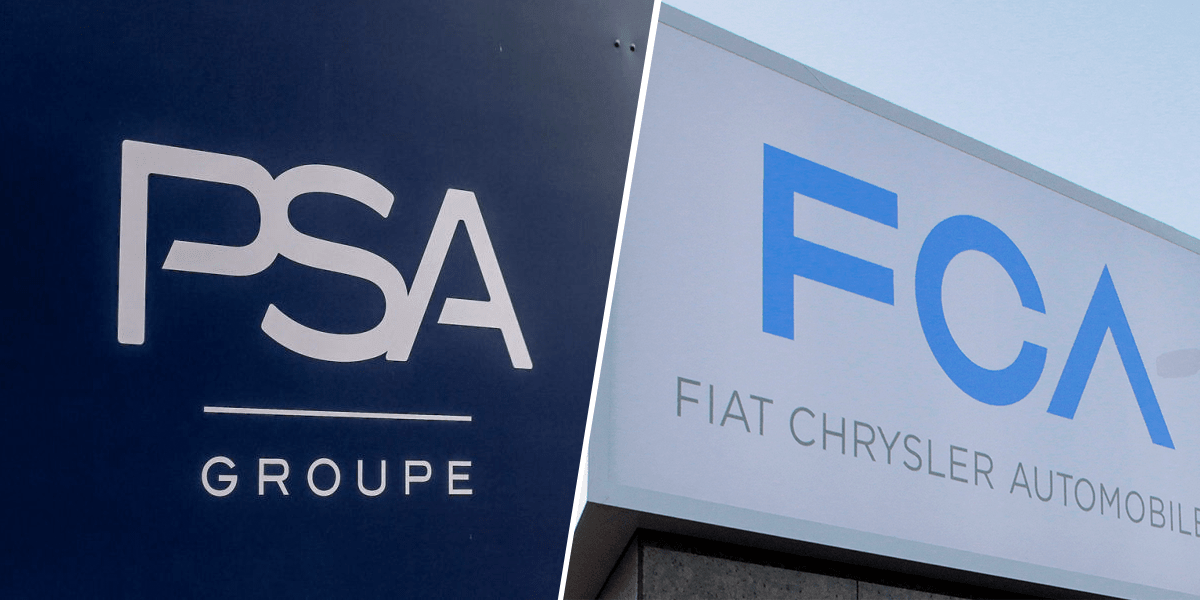PSA and Fiat Chrysler agree on merger
PSA and Fiat Chrysler have agreed on a merger. However, the details are still open, as the agreement is to be worked out in the coming weeks. It is also open what this means for electric mobility in the new company.
++ Kindly find all updates to this article below. ++
According to both vehicle manufacturers, they plan to base a joint venture in the Netherlands which will be held by PSA and Fiat Chrysler, with a 50 per cent stake each. PSA CEO Carlos Tavares is to become the Chief Executive, the Board of Directors is to be chaired by the current FCA Chairman John Elkann, a grandson of the long-time Fiat boss Giovanni Agnelli.
This would create the world’s fourth-largest automobile manufacturer in terms of sales after Volkswagen, Toyota and Renault-Nissan. The target is sales of 8.7 million vehicles per year, total sales of 170 billion euros and an operating result of more than eleven billion euros.
“This convergence brings significant value to all the stakeholders and opens a bright future for the combined entity,” says Tavares. “I’m pleased with the work already done with Mike [Manley, FCA-boss, Ed.] and will be very happy to work with him to build a great company together”. Manley added: “We have a long history of successful cooperation with Groupe PSA, and I am convinced that together with our great people, we can create a world-class global mobility company.”
The reasons for the merger are cost and long-term competitiveness. According to the PSA and FCA, the merger would generate synergies of €3.7 billion per year without closing a plant, but the merged company would not achieve 80 per cent of these synergies until its fifth year. Until then, more costs are likely to be incurred: The companies put the one-off amount at 2.8 billion euros. One thing is clear: PSA and Fiat Chrysler also want to share the high costs for new technologies such as electric cars and autonomous driving in relevant future fields.
What the 50:50 joint venture claims to be a “merger between equals” is, however, a merger of two very different companies. For Fiat Chrysler, business in Europe has become increasingly difficult in recent years (apart from minor successes with Jeep) – but sales in North America with Jeep and Dodge are going very well, and Chrysler and Jeep are also well-known brands in China. PSA, on the other hand, is not active in North America, all trials in China have not been successful so far, but in Europe, things are going well again, and margins are rising steadily. From this point of view, a merger would make global sense – in terms of development and purchasing it would leverage synergies without being in direct competition on the same markets.
PSA and FCA to roll out their own EV platforms
However, it remains to be seen how the two companies will achieve this in the field of electromobility. In 2020, PSA will launch the recently introduced Peugeot e-208, the Opel Corsa-e and the heaviest model DS 3 Crossback E-TENSE based on the specially developed e-CMP. With the EMP2 platform, plug-in hybrids are possible for larger models, such as the DS 7 or Opel Grandland X. FCA will also be making several model premieres in 2020, such as the Jeep Renegade and Compass as PHEV, and the new electric Fiat 500 will be presented at the Geneva Motor Show in spring.
Recently, Roberto di Stefano, FCA’s head of electronics, explained that there was no “delay”. He added that the company was now on about the same level as their competitors. The company has high hopes for the electric Fiat 500 in particular, whose exact designation FCA has not yet revealed. The catch: It should not only become a converted Fiat 500 but on an entirely new electric platform for smaller vehicles to develop.
In other words, both FCA and PSA with the e-CMP are currently rolling out their new e-platforms (or in the case of PSA a multi-energy platform for several drive technologies), which were developed for a lot of money. Stopping one of the platforms shortly after its launch (and converting the plants to the other platform) is a disaster from a business point of view. The parallel operation of two similar platforms also makes little sense – when one wanted to create synergies quickly. This is just one of many points that the managers of the two companies have to clarify before a final agreement can be reached.
Incidentally, the merger will also have an impact on the supplier market. PSA has already announced its intention to sell its 46% stake in Faurecia before the merger, probably to PSA shareholders. FCA will probably do the same with its shares in Comau.
Update 18.12.2019: Following the merger talks at the end of October, PSA and Fiat Chrysler Automobiles have now signed a binding merger agreement. The merger, subject to approval by the competition authorities, is expected to be completed in 12 to 15 months and will create the fourth-largest global automaker in terms of sales and the third largest in terms of revenue.
The two companies reiterated their target of achieving savings of €3.7 billion through the merger without closing a factory. So far, employee representatives have supported the merger, but this may change: According to an analysis by the major Swiss bank UBS, nine of the 28 European plants in the joint venture are superfluous, two out of five in Latin America. At the Italian FCA plant in Melfi alone, where the Jeep Renegade PHEV is soon to be built, more than half of the 7,300 employees were recently on short-time work. Other experts speak of around 10,000 employees who are largely superfluous. The merged company would have 410,000 employees worldwide.
fcagroup.com, groupe-psa.com, finanznachrichten.de, reuters.com, groupe-psa.com, fcagroup.com





0 Comments